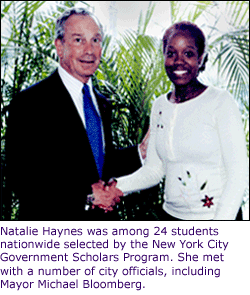

 |
|||||||||
Nursing student Natalie Haynes finds her niche working on behalf of New York City residents. |
|||||||||
 As a Government Scholar in the greatest city in the world, I had the opportunity to identify what I believed to be the ideal governmental position. We were given more than 30 job descriptions at a handful of different governmental agencies. After reviewing our options, we interviewed for two weeks with as many agency officials as possible, searching for that perfect placement. Luckily, I found mine in the city’s Department of Health and Mental Hygiene. When I read the department’s mission statement, I was blown away by its purpose: “to promote the health and mental health of all New Yorkers, the recovery of those with mental illness and chemical dependencies, and the realization of full potential of those with mental retardation and developmental disabilities.” Where else would I rather be? I interviewed with Chief of Staff Louise Cohen, who oversees all units, assists the commissioner in daily department management, and advises the commissioner on major policy, programmatic, and financial issues. She inspired me. Two days later, I received a call to interview a second time and was certain the department wanted me. Commissioner Thomas Frieden made a statement that confirmed my decision to work with the department. He said, “New York City is the greatest city in the world—and one of the healthiest… Our city has been in the forefront of public health for more than 300 years, pioneering efforts to ensure safe water, healthy food, and clean air, while lowering infant mortality rates, controlling infectious disease, and promoting healthy lifestyles… One of our primary goals is to prioritize our public health efforts to communities that need them the most.” I learned how these goals are put into action. I participated in City Hall meetings with health officials from the Centers for Disease Control and Prevention and met with a variety of experts: Wilfredo Lopez, the health department’s defense attorney; Cathy C. Luong, special aide to the commissioner; Richard T. Greene Jr., director of health services; Joann M. Orr, director of field operations in the Office of Community Affairs; Juan Pietri, captain of forensic service investigations; and Fernando A. Fernandez, director of community affairs. I came to understand how important it is for each New York City resident to have a primary care provider, to know how to prevent transmission of HIV/AIDS, to recognize depression and seek treatment, to learn how to live free of addiction to alcohol and other drugs, to know how to be screened for preventable diseases, to stay up to date on immunizations against communicable diseases, to live in a healthy environment at home, and to plan families and seek prenatal care. I was inspired to help the department touch the lives of every city resident and embraced the opportunity to help develop a public service health program for NYC residents. This experience has broadened my view of public health and nursing. Nurses have the power to make a difference in the lives of patients and families. Our long-term goal is to improve the lives of residents in our communities, our country, and our world. That’s why public health policies and programs are so important. It takes one person to notice a need for improvement in the community and to make it happen. It is up to health officials to bring the public’s health needs to the attention of legislators, who can ensure that policies and programs are written and carried out. Health care providers need to be aware of and educated about this process. Therefore, we need nurses with a desire to bring forth new policies and programs to be implemented. Thanks to an extraordinary summer, which included meeting New York Mayor Michael Bloomberg, I have committed my future to public service. After I graduate from the School of Nursing in May, I plan to work as a nurse (perhaps in maternal and child health, cardiac care, or as a visiting nurse—who knows?) and then attend law school to equip myself with the necessary skills to implement urgently needed public health policies and programs. I want to become the best health advocate nurse I can possibly be. So many people are helping make this possible. The people in New York City’s Department of Health and Mental Hygiene. Ellen Sovern, senior attorney in the city’s Social Security office, who never ceased to notice my potential. My dad and mom, for showing me the sky is the limit and backing me 150%. My daughter, Suli, the wind beneath my wings. And my professors in the School of Nursing, who have taught me so much and encouraged me, with patience, creativity, and dedication. Without their guidance, I would not have been prepared to take on the health problems of New York City last summer. I look forward to the day that I will arrive at my destination, and I welcome the journey that will take me there. —Natalie Haynes Natalie's story is part of a regular series on "Class Acts"—students who are leaders in the School of Nursing. |
|||||||||
|
|
|||||||||
|
|
|||||||||
| |
current issue . past issues . contact us . from the dean news briefs . milestones . class acts . alumni news Copyright © Emory University, 2004. All Rights Reserved |
||||||||
|
|
|||||||||